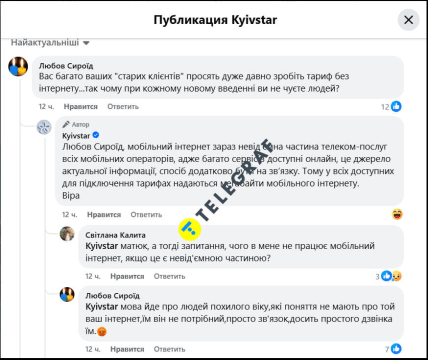"Holiday of freebies" at the expense of long-time subscribers. What's wrong with the tariffs of Kyivstar, Vodafone, and Lifecell?
Mobile operators have once again angered Ukrainians: tariffs continue to rise rapidly for long-time subscribers, while attractive conditions are offered to "switchers" from competing networks. As a result, a small injustice arises.
Digital technology expert eQualitie Alexander Glushchenko explained to "Telegraph" why prices for communication are rising "cleverly," how justified this is, and made predictions about future trends.
What surprises from operators are we talking about
The operator "Kyivstar" has outraged users by encouraging subscribers from other companies to switch to its network with their number — while the minimum tariff for current customers is higher. Clients complain about its policies: they feel their requests for a tariff without internet are ignored, there is no loyalty to long-time subscribers, and there are issues with connecting to discounted tariffs (pensioners from villages need to travel to the city).

Specifically, a dispute arose over the package "LOVE UA Magnet" (which includes 20 GB of mobile internet, unlimited calls to "Kyivstar," and 1200 minutes for calls to other mobile and landline numbers across Ukraine). A "superpower" is offered for selection, which can include unlimited internet, television, and other services. The cost of the contract starts from 100 UAH/month, with a subscription fee of 125 UAH for 4 weeks. The price remains unchanged for a year.
Customers express dissatisfaction that no matter how many times subscribers request a tariff without internet, the operator remains deaf to their needs. The "free" internet is actually paid for by the client, as its cost is already included in the tariff.
The company responded that today mobile internet is an integral part of telecom services, which is why free gigabytes are included in any available tariff.
This response did not placate dissatisfied subscribers. In comments, they noted that elderly people have no idea about mobile internet and asked why it doesn't work if it is an integral part of the services.
On the other hand, lifecell recently shocked its customers with the news that it will raise tariffs in February. However, it offered attractive prices to new customers who transferred their numbers to lifecell since December and a "stop-price" promotion (the ability to freeze the tariff). This price increase will not affect this category.

Vodafone also states that it is significantly raising tariffs but provides "compensation" by increasing the allotted internet volume.

Why are tariffs rising so cleverly
Expert Alexander Glushchenko predicted back in December for Telegraph that prices will eventually rise for all operators. This will happen gradually and in several stages (depending on strategies and calculations).
Currently, Glushchenko says, operators have no choice but to raise prices. After all, this is business, aimed at making money, not philanthropy.
"There are basic laws of economics that cannot be deceived. Any business makes adjustments for inflation, increased taxes, and currency fluctuations. Mobile communication should be more expensive because they have raised taxes and starting January 2025, the military levy (paid by employers for hired) on the amount of official salary — Ed.) will be 5% compared to 1.5% a month earlier.", Glushchenko explains.
The decision of the National Center for Operational and Technical Management of Telecommunications Networks (NCTM) obliging operators to ensure energy independence — 10 hours of network operation in case of outages by February 1, 2025 adds to expenses. Such energy independence is not free: batteries, generators, and fuel cost money. Moreover, electronic communications operators purchase electricity at commercial rates.
Additionally, the cost of participating in auctions, frequency purchases, expanding coverage and network capacity is included in the increase of tariff plans. And we must also consider the ongoing factor of war and regular restoration of destroyed infrastructure.
"This combination has hinted since July last year that mobile operators would be raising their tariff plans in the future. The only thing is that it won't happen all at once. They have a financial year, they have business planning. They plan and are ready to stretch all these expenses over time.", Glushchenko explains.
Operators are prepared to improve service according to government decisions, but in the end, it will still be the subscriber who pays.
Regarding why tariffs are raised in this manner, Glushchenko explains that operators do not do this synchronously and wait.
"They all wait and have their own action plan for raising tariffs. For example, two operators may raise prices almost simultaneously, while a third says, 'I'll wait a bit longer.' It depends on the financial capabilities of those who will wait. lifecell waited, gathered 'migrants' and now will also raise prices.", the expert shares.
Although it was evident that all prices would rise, this scramble using MNP (Mobile Number Portability) will only benefit those who switch to an operator with better coverage in their region.
Discounts for new customers – a feature of the Ukrainian market
For new customers, "Kyivstar" and lifecell offer very favorable conditions, while old customers are already paying more. This is a feature of the Ukrainian industry, where new subscribers are welcomed with cheap entry tickets, only to be charged later.
"For old subscribers, many Ukrainian mobile operators, as well as representatives of the telecom industry, show no loyalty whatsoever. It only exists for new subscribers. In my humble opinion, in an already established market, this is not entirely the right step. All potential subscribers already know what the internet is and what a mobile phone is; they do not need to try anything. Operators are measured by different criteria: by problems and the speed of their resolution, by customer orientation… When problems arise, it becomes a litmus test to see how quickly the company resolves issues and how customer-oriented it is in addressing technical and technological problems. If your provider is not ready to quickly fix things for you, or has some technical problems that they do not resolve, you need to change it. In a highly competitive market – it's simply,", Glushchenko explains.
For most subscribers, the brand of the company or its name means nothing; they may not even remember who provides the service. However, as soon as disappointing problems arise, subscribers are ready to make radical and unpopular decisions.
"I don't quite understand why someone would offer a cheap entry ticket? It's essentially an invitation, and then they start charging you full price. Although the migrating subscriber thinks this is their golden opportunity to outsmart the system, and now they will surely pay much less than with another operator. However, that's a myth. All marketers know that the 'unseen generosity' will be paid for later by the subscriber or by old subscribers. This is not entirely fair to subscribers who have been paying reliably for decades. For instance, I have been a subscriber to my provider for 19 years. If someone called me and said, 'We have a special super offer for you: pay for 10 months and get an extra 2 or 4 months, or let’s give you some personalized discount...' I would appreciate that as a subscriber. I would feel valued. But in reality, I see how newcomers are pampered, lured in, and offered personal discounts. Meanwhile, I, as a long-time subscriber, am modestly forgotten at whose expense this holiday of freebies occurs,", the expert concludes.
In the future, there will be competition for fiber optics in Kyiv, — forecast
Now competition has entered a new stage, and operators will be ready to poach subscribers from each other for mobile communication, home internet, and television, Glushchenko explains.
"Previously, there wasn't much competition for mobile subscribers. The market was stable: Lifecell was about third, Kyivstar and Vodafone were first and second. Everyone was satisfied. Now competition has entered a new stage. Operators will spend money to lure subscribers to themselves. This includes mobile subscribers, especially due to MNP. Previously, MNP was inconvenient – one subscriber would call another, and they would be warned that the number had been transferred. For many, this was unclear. Now it’s just ringing, and most people won’t know that a typical lifecell number starting with "063" is serviced by Vodafone or Kyivstar. Now they are ready to take subscribers from each other, including mobile ones,” the expert explains.
Companies will compete with bundles (composite packages where everything comes together) based on the principle of "Three in One": mobile internet + leading internet and television. In total, as a "group," it will be significantly cheaper than purchasing each service separately.
Additionally, operators will compete for Kyiv. This is the only place